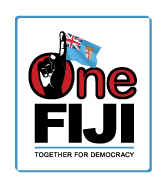Not only are the illegal and treasonous military regime out in numbers pushing their sham charter, they're also massaging public opinion on the farcical constitutional consultations.
Charter awareness programs resumes
17:05 Mon Apr 23, 2012
Report by: Roland Koroi
The Strategic Framework for Change Coordinating Office is continuing its Peoples Charter Awareness programs with plans to move to Kadavu and Vanua Levu soon.
The program which began in January this year has focused mainly on Suva’s peri-urban areas with more than 200 programs conducted in the Lami to Nasinu corridor.
The Charter awareness program centres on the government’s plans and initiatives under the 11 pillars of the Peoples Charter.
A statement from the Office of the Prime Minister says the forums create opportunities for people to recognise governments commitment to ensuring it pursues the avenues for sustainable development and address pertinent issues on common national identity, economic growth, poverty reduction and improving public sector services to name a few.
It says the forums are also important as it prepares people for the upcoming Civic Education on the consultation for the new constitution that commences next month.
Awareness programs resume this evening from 5pm to 7pm at the Tuilovoni Church and then from 7.30pm to 10pm at the Mataika Church.
Tomorrow teams will be at the Cargill Mandir from 5pm to 7pm and at the Sasawira Temple from 7.30 to 10pm.
They move to the Navuloa Church on Wednesday as well as the Temple at Mandir Street.
The Valili Temple will play hosts to awareness teams on Thursday from 5 to 7pm while teams will be at the Draunitalia Methodist Church from 7.30 to 10pm.
On Friday they will be at the Peceli Methodist Church hall and the Nakasi High School.
And finally on Monday next week, teams will be at Wainunu and the Hart hall.

1 comment:
Censors lift in Fiji's newsrooms
Philippa McDonald reported this story on Sunday, February 26, 2012 08:10:00
Listen to MP3 of this story ( minutes)
ALTERNATE WMA VERSION | MP3 DOWNLOAD
ELIZABETH JACKSON: After almost three years the censors have left Fiji's newsrooms.
But has it made much of a difference is it really making to freedom of speech?
The interim government has lifted emergency laws but has also introduced new decrees which some fear will still limit freedom of expression.
The ABC's Philippa McDonald has gained exclusive access to the Fiji Times and she's filed this report from Suva.
(sound of printing press)
PHILIPPA MCDONALD: It's Friday night and the printing presses are rolling at Fiji's biggest selling newspaper.
In the past the Fiji Times was labelled an enemy of the interim government by the country's military dictator, Commodore Frank Bainimarama and the introduction of a media decree meant Australia's News Limited had to sell off its majority ownership.
For almost three years as many as three censors have been in the Fiji Times newsroom each night, deciding what will go in the next morning's edition.
Fred Wesley is the Fiji Times' editor in chief.
What kind of stories were spiked, as a rule?
FRED WESLEY: We had issues that concerned the national airline, Air Pacific, issues that concerned the sugar industry for instance, the water industry.
PHILIPPA MCDONALD: And in that climate Mr Wesley says he told his journalists to beware of the pitfalls of self censorship.
Is there a free media in Fiji?
FRED WESLEY: Is there a free media? Mmm, to some extent.
PHILIPPA MCDONALD: And to some extent?
FRED WESLEY: Maybe not.
PHILIPPA MCDONALD: Now he says with censors out of the newsroom it's getting easier to publish stories which would have previously been spiked - but they're treading carefully.
FRED WESLEY: It's still allowing us to explore - to explore how far we can go and I think that's a good thing for this country. I think it's good for our readers; I think it's good for the overall development of this nation and I think it's good in terms of moving us forward. twi
PHILIPPA MCDONALD: Sharon Smith Johns is the permanent secretary for information for Fiji's interim government
SHARON SMITH JOHNS: So from my part, for the Ministry of Information, where we were in the newsrooms censoring, we take a big step back now; that's not my role. It's not about censoring or monitoring the media.
PHILIPPA MCDONALD: But it's about the government message?
SHARON SMITH JOHNS: It's about the government message.
PHILIPPA MCDONALD: In the weeks after the public emergency laws were lifted in Fiji, a raft of new decrees were introduced.
One allows for the interim prime minster Frank Bainimarama and his ministers to say what they like about an individual and offers protection for the media to print or broadcast it.
Reverend Akuila Yabaki from the Citizens Constitutional Forum says it has the effect of extending parliamentary privilege to an unelected government.
AKUILA YABAKI: There's no parliament. There's no elected parliament but then the privilege of being in parliament, of saying things in parliament, is accorded to people in ordinary life; to cabinet ministers. They can say what they want and be reported in the media - welcome that to be reported in the media.
But what about the counter - the response or the reaction from people to what they're saying; there's no freedom there.
PHILIPPA MCDONALD: And with elections due in September 2014, Reverend Yabaki says that doesn't help Fiji's transition towards democracy.
ELIZABETH JACKSON: Philippa McDonald with that report from Suva.
Post a Comment